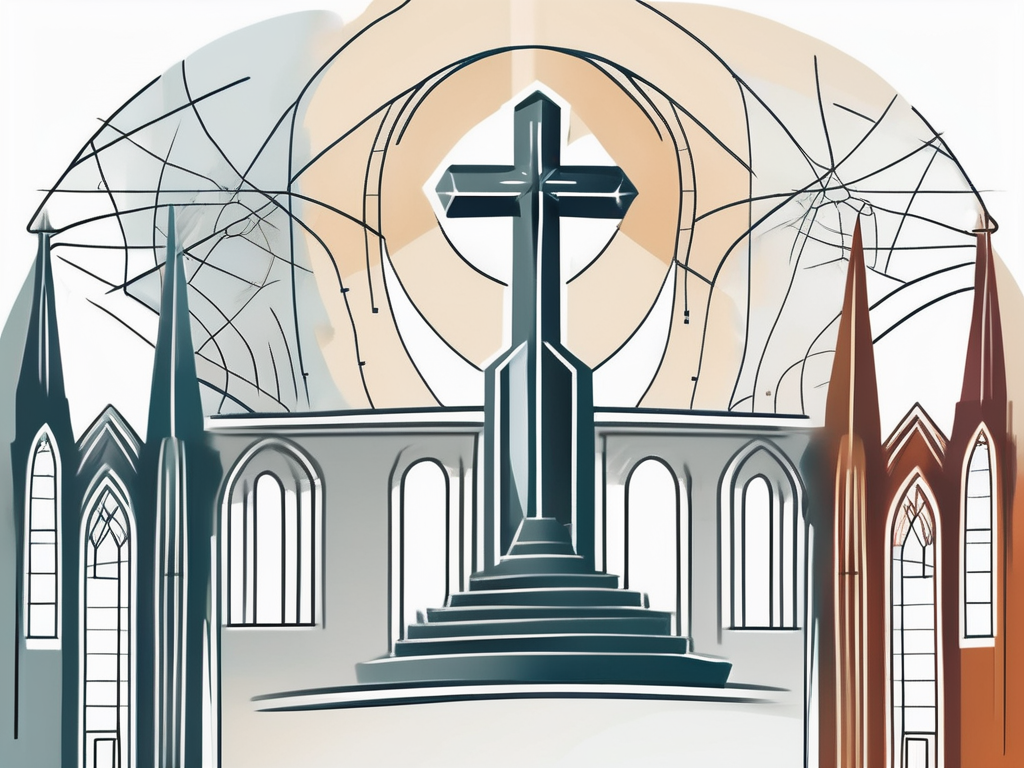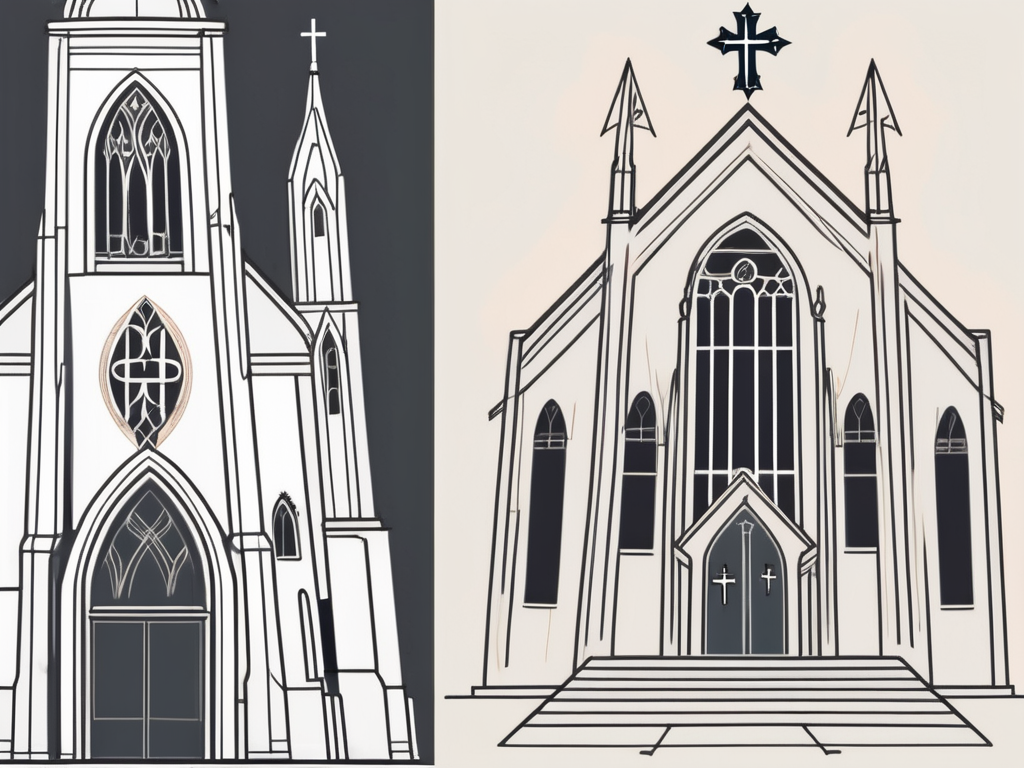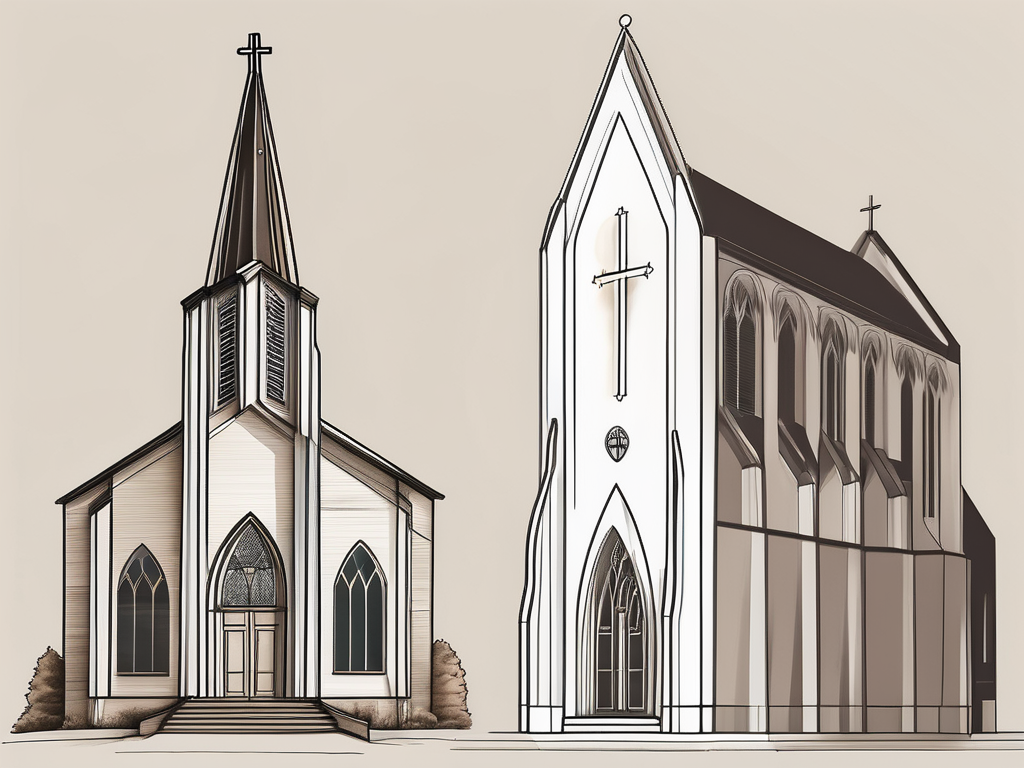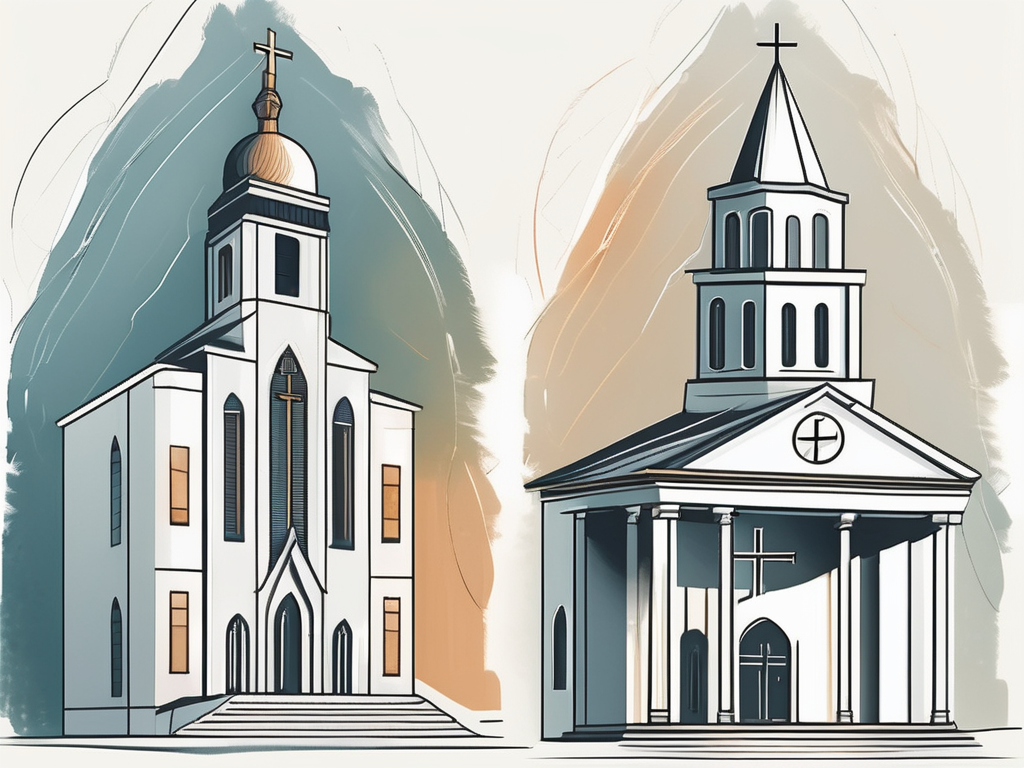In the world of Christianity, there exist a multitude of denominations, each with its unique beliefs and practices. Two of the most prominent Protestant denominations are Methodism and Baptism. While they both share a common foundation in Christianity, they have distinct origins, core beliefs, worship styles, church governance, and views on sacraments. In this article, we will delve into the Methodist and Baptist traditions, exploring their similarities and differences to gain a comprehensive understanding of these faiths.
Understanding the Origins of Methodism and Baptism
The Birth of Methodism
Methodism, at its core, is rooted in the teachings of the Anglican Church. In the 18th century, a notable figure by the name of John Wesley emerged as a prominent clergyman within the Church of England. Wesley, along with his brother Charles, sought to establish a movement that emphasized personal piety and social justice. Through their sermons and preaching, they aimed to reform the Anglican Church from within, placing an emphasis on spiritual disciplines, including Bible study and prayer.
This movement, known as Methodism, gained traction amongst the working-class individuals who were seeking a more personal and experiential form of Christianity. The Methodist Church eventually separated from the Anglican Church, becoming an independent denomination.
As Methodism spread, it brought about significant changes in the lives of its followers. The movement placed a strong emphasis on education, leading to the establishment of numerous schools and colleges. These institutions played a crucial role in providing education to those who previously had limited access to learning opportunities. Methodists also actively engaged in social reform movements, advocating for the abolition of slavery, prison reform, and the improvement of working conditions for the poor.
Methodism’s impact extended beyond England, as missionaries were sent to various parts of the world to spread the teachings of the movement. These missionaries established churches, schools, and hospitals, leaving a lasting legacy in many countries. Today, Methodism remains a vibrant and influential denomination, with millions of followers worldwide.
The Emergence of Baptism
Baptism, on the other hand, traces its origins back to the time of Jesus Christ. The Baptist tradition finds its roots in the biblical accounts of John the Baptist, who baptized Jesus in the River Jordan. John preached repentance and the necessity of baptism as a symbol of being born again in Christ.
Over time, this belief system gained popularity among early Christians, and the Baptist denomination developed its distinct identity. Baptists stress the importance of adult baptism, viewing it as a public profession of faith rather than an infant baptism based on the belief in original sin. They believe that only those who have made a personal commitment to Christ should be baptized.
Baptism holds significant symbolism for the Baptist tradition. It represents the believer’s identification with the death, burial, and resurrection of Jesus Christ. Through immersion in water, believers publicly declare their faith and commitment to follow Christ. This act of baptism is seen as a powerful spiritual experience, marking the beginning of a new life in Christ.
Throughout history, the Baptist tradition has played a vital role in championing religious freedom and individual liberty. Baptists have been strong advocates for the separation of church and state, believing that each person should have the freedom to worship according to their conscience. This commitment to religious freedom has had a profound impact on societies around the world, shaping the development of democratic values and human rights.
Core Beliefs and Doctrines
Fundamental Beliefs of Methodists
Methodists affirm many of the traditional Christian doctrines, including the belief in the Holy Trinity, the divinity of Jesus Christ, and the atoning power of His death and resurrection. They hold scripture in high regard and believe that it is divinely inspired but also emphasize the role of tradition, reason, and personal experience in interpreting the Bible.
An important concept within Methodism is the doctrine of salvation by grace through faith. Methodists believe that salvation is a gift from God and cannot be earned through good works alone. They emphasize the need for personal transformation through the work of the Holy Spirit, leading to a life of holiness and righteous living.
Methodists also place a strong emphasis on social justice and caring for the marginalized and oppressed. Inspired by the teachings of Jesus, they actively engage in works of mercy and seek to address systemic injustices in society. This commitment to social action is rooted in the belief that faith should be lived out in practical ways, reflecting God’s love for all people.
Another key aspect of Methodist theology is the concept of sanctification. Methodists believe in the possibility of experiencing a second work of grace, known as entire sanctification or Christian perfection. This is seen as a process of being filled with the Holy Spirit and becoming more like Christ in thought, word, and deed. It is believed that through this process, believers can attain a state of perfect love and complete devotion to God.
Key Tenets of Baptists
Baptists share many of the core beliefs held by Methodists, such as their acceptance of the Holy Trinity and the divinity of Jesus Christ. However, there are several notable differences in Baptist theology.
Firstly, Baptists espouse the doctrine of soul competency, which emphasizes the individual’s freedom and responsibility to respond to God’s grace. They believe that every believer has the ability to interpret scripture and discern God’s will independently, without the need for an intermediary authority.
Baptists also place a strong emphasis on the autonomy of the local church. Each congregation is seen as self-governing and has the freedom to make decisions regarding matters of faith and practice. This congregational polity allows for a high degree of individual and community involvement in the life of the church.
Additionally, Baptists place a significant emphasis on the believer’s personal relationship with Jesus Christ. They view baptism as a symbolic act of obedience and identification with Christ, a public declaration of one’s faith. Baptists practice believer’s baptism, whereby only those who have made a personal confession of faith are baptized.
Baptists also hold to the principle of religious liberty, advocating for the separation of church and state. They believe in the freedom of conscience and the right of individuals to worship according to their own convictions, without interference or coercion from the government.
Furthermore, Baptists have historically been champions of religious tolerance and the protection of minority rights. They have played a significant role in advocating for religious freedom and the rights of all individuals to practice their faith without fear of persecution or discrimination.
Worship Styles and Practices
Worship is a fundamental aspect of religious expression in various Christian traditions. It serves as a time for believers to come together, connect with God, and deepen their faith. In this discussion, we will explore the worship styles and practices of Methodist and Baptist churches, highlighting their unique characteristics and approaches to worship.
Methodist Worship Traditions
In Methodist churches, worship serves as a vital aspect of faith expression. Services typically include traditional hymns, contemporary worship songs, and prayers. The order of worship often follows a structured liturgical format, with the observance of the sacraments of baptism and communion.
Methodist churches value congregational participation, and sermons play a central role in their services. The preached word is viewed as an avenue for spiritual growth and moral guidance. Additionally, many Methodist churches utilize choirs and musical ensembles to enhance worship experiences.
One unique aspect of Methodist worship is the emphasis on Wesleyan theology, named after the movement’s founder, John Wesley. This theology emphasizes the concept of “prevenient grace,” the belief that God’s grace is available to all individuals even before they are aware of it. This theological perspective often finds its way into Methodist worship services, shaping the content of sermons and prayers.
Furthermore, Methodist churches place great importance on social justice and community outreach. This commitment is often reflected in their worship practices, with prayers and sermons addressing issues of poverty, inequality, and the pursuit of justice.
Baptist Worship Customs
Baptist worship services, in contrast, have a more informal structure, often lacking the formal liturgical elements found in Methodism. Worship in Baptist churches is characterized by passionate singing, heartfelt prayers, and expository sermons focused on biblical teaching. Services are typically led by a pastor, and congregational participation is encouraged through responsive readings and testimonies.
Baptist churches place great emphasis on the autonomy of the individual congregation, allowing flexibility in worship styles and practices. Consequently, you may find variations in musical styles, including traditional hymns or contemporary praise songs, depending on the preferences of the congregation.
Another distinctive feature of Baptist worship is the practice of believer’s baptism. Unlike other Christian traditions that practice infant baptism, Baptists believe in baptizing individuals who have made a personal confession of faith in Jesus Christ. This act of baptism is often celebrated during worship services, symbolizing the believer’s identification with Christ’s death, burial, and resurrection.
Furthermore, Baptist worship often incorporates a strong sense of community and fellowship. Many Baptist churches prioritize building relationships among their members, fostering a welcoming and inclusive atmosphere. This emphasis on community is reflected in various aspects of worship, such as communal prayers, sharing of personal testimonies, and opportunities for congregational interaction.
In conclusion, while Methodist and Baptist churches share a common Christian faith, their worship styles and practices differ in significant ways. Methodist worship is characterized by a structured liturgical format, congregational participation, and an emphasis on social justice. On the other hand, Baptist worship is more informal, with a focus on passionate singing, expository sermons, and the autonomy of individual congregations. Both traditions offer unique and meaningful worship experiences, providing avenues for believers to connect with God and grow in their faith.
Church Governance and Structure
The Hierarchical Structure of Methodism
Methodist churches adhere to a hierarchical organizational structure. At the highest level, there are bishops who oversee multiple districts or regions. Beneath the bishops, there are superintendents or district supervisors who provide guidance to individual churches in their jurisdiction. Local churches are led by ministers, pastors, or clergy appointed by the bishop.
This hierarchical structure allows for the centralization of decision-making and coordination of resources within the larger Methodist organization. It also facilitates a sense of unity and shared purpose among Methodist congregations.
The Congregational Polity of Baptists
In contrast, Baptist churches operate under a congregational polity, which means that each local church is autonomous and self-governing. Congregational polity emphasizes the priesthood of all believers, giving each member a voice in the affairs of the church.
Baptist churches typically have a board of deacons or elders responsible for administrative decisions and spiritual oversight. Major decisions, such as calling a pastor or adopting a budget, are made collectively by the congregation during regular business meetings.
Role of Sacraments in Both Denominations
Sacraments in Methodism
Methodists recognize two sacraments: baptism and communion. Baptism is seen as a means of grace, signifying initiation into the church and the washing away of sin. Methodists practice both infant baptism and believer’s baptism, leaving the decision to parents or individuals.
Communion, also known as the Lord’s Supper, holds a central place in Methodist worship. It is viewed as a means of grace, where the bread and wine symbolize the body and blood of Christ. Communion is open to all baptized believers and is often practiced monthly or during special services.
Sacraments in Baptist Tradition
Baptists recognize two ordinances: baptism and the Lord’s Supper (communion). As previously mentioned, Baptists practice believer’s baptism, considering it a public profession of faith and obedience to Christ’s command. Immersion is the preferred mode of baptism, representing burial and resurrection with Christ.
The Lord’s Supper in Baptist churches is a memorial act, signifying the believer’s remembrance of Christ’s sacrifice on the cross. It is open to all baptized believers and is typically observed less frequently than in Methodist worship services.
In conclusion, while Methodism and Baptism share a common foundation in Christianity, their beliefs and practices diverge in various aspects. Methodism emphasizes personal piety, the role of tradition and reason, and the hierarchical structure of church governance. On the other hand, Baptists prioritize soul competency, believer’s baptism, and congregational autonomy. Both denominations hold the sacraments of baptism and communion in high regard but differ in their theological understanding and frequency of observance. By understanding the distinct characteristics of these traditions, we can appreciate the richness and diversity within the broader Christian faith.












